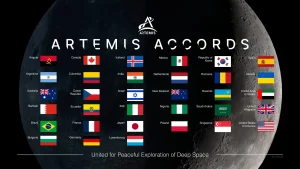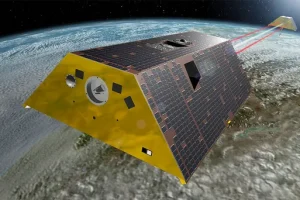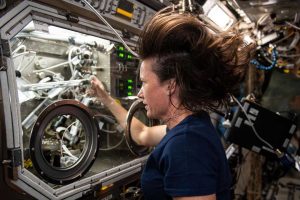Signees to the Accords can participate in the Artemis space programme lead by Nasa, which has – for example – long-term goals to revisit the Moon, establish a lunar base and travel to Mars.
Basically, it signifies aligning with the major US space bloc, as opposed to the rival Sino-Russian one, for example.
“Belgium has always had its feet on the ground and its head in the stars,” said Belgium’s Minister of Foreign Affairs, European Affairs and Foreign Trade, Hadja Lahbib.
“Our country is one of the world leaders in space exploration. The signing of the Artemis Accords reflects our ongoing commitment to sustainable and responsible space, and will strengthen our ties with international partners. It will also open up new economic opportunities for our companies, which have world-renowned expertise in the space sector.”
The Secretary of State for Space Policy for Belgium – which is also a member of the European Space Agency – highlighted that the agreement raises the possibility of a Belgian astronaut working on a Nasa mission.
“Signing up to the Artemis Accords is part of our cooperation approach and will enable Belgium to join the working group of states that have also signed up to the accords,” said Thomas Dermine.
“Signing these accords is also a necessary and important condition for the possible participation of a Belgian astronaut in a mission under the Artemis programme, which aims to return to the moon with several missions as from 2027”.
Artemis Accords
The number of countries agreeing to the Artemis Accords now totals 34, including the USA. Angola had been the most recent country to join, signing up in December 2023.
According to Nasa, the agreements enable the implementation of key obligations in the 1967 Outer Space Treaty. They are also intended to reinforce best practices and norms of responsible behaviour in space. These include areas such as the public release of scientific data, emergency assistance, the registration of space objects and orbital debris disposal.
You can read more about the Accords on the Nasa website.
The eight original signees for the Artemis Accords, in October 2020, were Australia, Canada, Italy, Japan, Luxembourg, the United Arab Emirates, the United Kingdom and the United States itself.
Image: Nasa – Artist rendering of astronaut working on the moon
See also: NASA, UAE collaborate for Artemis Gateway Crew and Science Airlock
 Electronics Weekly Electronics Design & Components Tech News
Electronics Weekly Electronics Design & Components Tech News






Very strange. I would have expected that these kinds of agreements would be signed between ESA and NASA and not at the level of an ESA-member country. Did I misunderstand it?
Bernard Guillaume
It is definitely on a national basis, Bernard. I believe the reason will lie in ‘space law’ with the accords being rooted in the UN’s Outer Space Treaty (1967). Signing the accords means agreeing to co-operate around issues such as resource extraction and militarisation – the signatories will have to have sovereign rights, which the EU does not yet have.
Also, the Accords are meant to be many-layered – countries can choose to participate in specific Artemis programme activities, at a cost, or just agree to the principles. A one size fits all would not necessarily be appropriate.
I suspect it’s all a legal minefield and this area will become a feeding ground for lawyers in the future….what is the basis for any ‘space law’? Who has authority? Who enforces it?… When a Japanese lander arrives on the Moon, for example, any resources extracted may not belong to Japan but the U.S.A. Japan, a signatory, would have agreed to this. That’s my understanding.